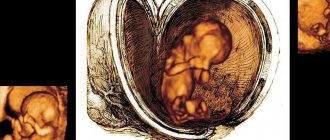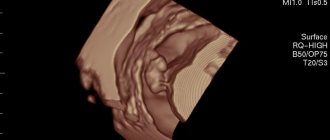Photo: UGC The 19th week of pregnancy marks approximately half the period intended for a woman by nature before the birth of the baby. By this point, the rounded belly can no longer be hidden, the parents know the sex of the unborn child, and the baby is very active inside the mother. We will tell you in the article what a pregnant woman should pay attention to at this time.
How the fetus develops: what happens to the baby at 19 weeks of pregnancy
If you are experiencing the 19th week of pregnancy, it means that half of the waiting period for your baby has already passed.
Your baby is already a real fetus, because its size at the 19th week of pregnancy can be compared to a large apple: its body reaches 15-25 cm, and its weight is 200-350 grams. The organs and systems of the fetus are actively developing during this period, and the nervous system is improving especially rapidly. Fetal development at 19 weeks gestation:
- the formation of the senses (touch, vision, smell and hearing) is almost complete: when the visual analyzers are fully formed, the child will begin to open his eyes;
- a child at 19 weeks of pregnancy is able to sense sounds and light, he can suck and yawn, he smiles, hiccups and swallows;
- connections are built in the brain between nerve cells that send signals to each other; the cerebral cortex is formed, which is able to give commands to the baby to perform simple actions;
- the skin of the fetus at the 19th week of pregnancy is red and wrinkled, but this is a temporary phenomenon: a little later, when a layer of fat begins to form under the skin, its cover will become smoother;
- the baby’s digestive system is already training so that by the time it is born it will be ready to digest what it eats; the intestines contain meconium from the contents that the baby swallows with amniotic fluid;
- the fetal kidneys are already formed, so they are able to excrete urine, but the lungs are still at the stage of creation;
- the fetus has a developed skeleton, the cartilage and bones of which become stronger every day; the baby’s arms and legs have taken on proportional sizes;
- at the 19th week of pregnancy, you can already find out the sex of the baby, since its reproductive system is also actively developing.
How baby's size changes
Embryo development is an exciting process that interests every mother. After IVF, women sometimes feel the onset of pregnancy, the embryo - first a pulling sensation, then a tingling sensation in the abdomen. After the test reveals pregnancy, the embryo needs to be taken care of - don’t be nervous, eat right, take walks. After all, successful embryo insertion and conception are only the first steps towards the birth of a baby.
Active recreation is not advisable at this time. You need to experience more positive emotions, and also prepare for upcoming motherhood. Women read books on child care and admire the first ultrasound images. Until the second trimester, the development of the embryo goes unnoticed - the woman’s tummy protrudes slightly. The abdomen begins to actively grow towards the end of the second trimester, when the development of the embryo enters the stage of active growth. The fetus gains mass and grows, gradually begins to move and respond to sounds. Changes are observed every week of pregnancy, the embryo develops rapidly. You can track your child's height and weight at each stage using abdominal images. At this time, the baby's size is measured in millimeters.
The growth and weight of the embryo is monitored from the second trimester of pregnancy; at this time the embryo begins to grow rapidly. These parameters are quite individual; all babies gain weight differently. At this stage, it is not the size of the child that is important, but its proper development. However, for those who still want to compare the size and weight of their child with the “standards”, a special obstetric table will help.
Embryo by week of pregnancy:
Don't worry if your child weighs slightly less than normal for his age. The doctor would definitely pay attention if something in the development of the fetus went wrong.
Study the development of your baby, watch how he grows and rejoice in the fact that you will soon have a child!
Baby's activity and movements
It is at 19 weeks that the baby is most active: there is still enough free space in the uterus for him to move, and the nervous system stimulates the brain to improve movements. The child clenches his fingers and somersaults, pushing away from the walls of the uterus. The development of the fetus in the 19th week of pregnancy allows the expectant mother to experience completely new sensations: first, light tremors, then more active movements. These movements bring the main positive news: the pregnancy is proceeding normally. If this is your second or third pregnancy, you may feel fetal movements a couple of weeks earlier than this.
How does mom feel?
The 19th week of pregnancy brings not only the activity of the fetus, but also external changes in the woman, as well as new manifestations in the body:
- the mammary glands stop hurting, breast volume increases noticeably, colostrum may appear from the nipple;
- with the growth of the uterus at the 19th week of pregnancy, not very comfortable sensations may appear - they arise due to muscle stretching as the size of the fetus increases;
- Stretch marks may form on the skin of the abdomen: in order not to think about how to get rid of them after childbirth, buy a special cream or gel in advance and use it daily after a shower;
- at the 19th week of pregnancy, many women experience symptoms of iron deficiency anemia (general weakness in the body, desire to sleep during the day, dizziness): tell your gynecologist about this, and he will prescribe you medications that replenish iron deficiency; if the symptoms of anemia are not too pronounced, try to introduce foods containing the necessary microelement into your diet.
Leading specialists in the management of complex pregnancies in the Southern Federal District
Ermolaeva Elvira Kadirovna is a well-known and recognized specialist in the North Caucasus in the field of diagnosis and treatment of miscarriage, miscarriage, recurrent miscarriage, management of pregnant women with thrombophilia, antiphospholipid syndrome (APS), systemic lupus erythematosus (SLE), uterine fibroids, management of pregnancy in young and older pregnant women (after 38 years), management of capricious pregnant women, management of pregnant women with excess body weight. A good obstetrician-gynecologist, a specialist in rational nutrition during pregnancy, a physiotherapist-resortologist, an experienced ultrasound doctor. Those who want to maintain their figure and successfully carry woman's pregnancy.
Ermolaev Oleg Yurievich Candidate of Medical Sciences, gynecologist-endocrinologist with 25 years of experience and successful experience in managing pregnancy in women with uterine prolapse, bicornuate uterus, saddle uterus and other malformations of the genital organs, managing pregnant women with livedo, thrombophilia and antiphospholipid syndrome (APS) , polycystic ovary syndrome. Management of multiple pregnancies, which require special attention and experience from doctors. Management of pregnancy after IVF, ICSI, after artificial insemination. Management of pregnant women with placental insufficiency. Management of pregnancy against the background of an IUD.
About the doctors of the Clinic in detail...
INTERNATIONAL RECOGNITION of the reputation and achievements of the Women's Health Resort Clinic in the development and implementation of effective and safe treatment methods and the quality of medical services provided is the AWARDING of the Women's Health Resort Clinic in Pyatigorsk with the SIQS International QUALITY CERTIFICATE in the field of medicine and healthcare. International Socratic Committee, Oxford, UK and Swiss Institute for Quality Standards, Zurich, SWITZERLAND. Read more…
Belly at 19 weeks of pregnancy
- The belly is already noticeable, and it is difficult to hide it under clothes. As a rule, during this period, many expectant mothers try to change their everyday clothes to more spacious and comfortable ones. If you continue to wear your usual clothes, make sure that they do not put pressure on your tummy.
- The fundus of the uterus at the 19th week of pregnancy is a couple of centimeters below the navel - the gynecologist will tell you about this. In this case, the uterus puts pressure on the internal organs, which move from their usual positions, which causes the woman some discomfort.
- The digestive and genitourinary systems may also experience difficulties at this time: as a result of the pressure of the uterus, the urge to urinate, constipation, and heartburn often occur. You should not expect that such phenomena will go away on their own: seek advice and help from a gynecologist to prevent symptoms of cystitis and the occurrence of hemorrhoids.
- With active movement, shortness of breath and difficulties during the inhalation stage may occur, since the uterus presses on the diaphragm: to feel relief, you need to lie down.
- Not only the uterus and fetus grow, the amount of amniotic fluid also increases: at the same time, the back may become tired, and fatigue quickly occurs.
To reduce all these discomforts, try to get enough sleep, rest and not overload your body with heavy food. A bandage for pregnant women will reduce the pressure of the uterus on the internal organs and support the lower back.
Timing of the threat of pregnancy, timing of the threat of miscarriage
The threat of miscarriage most often occurs during
5-6 weeks of pregnancy 7-8 weeks of pregnancy 10-12 weeks of pregnancy 15-16 weeks of pregnancy 20-21 weeks of pregnancy 24-25 weeks of pregnancy 26-28 weeks of pregnancy 30-31 weeks of pregnancy 32-34 weeks of pregnancy
During these periods of pregnancy, PHYSIOLOGICALLY (provided for by the natural characteristics of human physiology), the tone of the uterus increases significantly and there is a threat of miscarriage, the threat of termination of pregnancy, and the threat of premature birth.
Pain and bleeding at 19 weeks of pregnancy: what do they signal?
Vaginal pain and bleeding at 19 weeks of pregnancy are not normal and may indicate serious problems:
- damage to the cervix;
- problems and pathologies occurring in the uterus;
- deficiency of progesterone - the hormone responsible for bearing a child;
- frozen pregnancy.
Normal are periodically occurring moderate pain in some areas of the body: in the calf muscles (due to swelling and lack of calcium, there can be not only pain, but also cramps), head, abdomen (due to the fact that the walls of the uterus are stretched).
Good to know
What to do about prenatal depression?
Just peace of mind! Learning to avoid stress
How to survive your wife's pregnancy (a practical guide for men)
How to deal with irritability during pregnancy
Basics of mutual understanding between a pregnant woman and her mother
Features of the use of drugs during pregnancy
All texts for pages about mother and baby were kindly provided by RAMA Publishing - these are chapters from the book by Svetlana Klaas “Your Favorite Little Man from Conception to Birth”, reviewer Irina Nikolaevna Kononova, Candidate of Medical Sciences, Associate Professor of the Department of Obstetrics and Gynecology of the Ural State Medical Academy (Ekaterinburg).
Necessary tests and examinations
At the 19th week of pregnancy, a woman needs to undergo a monthly examination by a gynecologist.
Tests and examinations that must be completed during this period:
- blood test: will show the level of hemoglobin in the blood and the possible presence of anemia, hCG level, estriol level, alpha-fetoprotein (AFP) protein level, progesterone level; these tests will show the possible risks of developmental pathologies in the fetus;
- urine test: will show the possible presence of infection;
- Fetal ultrasound: will show whether there are any risks to the normal development of the fetus; An ultrasound diagnostic specialist will examine the thickness of the nasal septum, the circumference of the collar area, the baby’s heart rate, physical activity, the condition of the middle muscular layer (myometrium) of the uterus, amniotic fluid; An ultrasound will also show the gender of the baby.
What is pregnancy screening
Thanks to the study, the doctor can diagnose certain developmental defects with certain accuracy.
Such a study includes the following procedures:
- Blood test from a vein
- Ultrasound
In Russia, only routine ultrasound is inevitably prescribed. Full screening is not recommended in all cases. If your doctor insists on having it done, then you shouldn’t worry or get upset in advance. As a rule, it should be done in the following situations:
- if the pregnant woman is over 35 years old;
- if the child’s father is over 40 years old;
- one of the family members has genetic pathologies;
- the woman suffered an infection during pregnancy;
- the pregnant woman took medications that may adversely affect the development of the child;
- women's work in hazardous industries.
The importance of early detection of any pathologies can be noted. After all, this is what makes it possible to begin the necessary treatment as early as possible. If during screening the doctor sees certain deviations from the norm, then the pregnancy is monitored more carefully and seriously.
Screening during pregnancy is done three times. If necessary, there is the possibility of additional examination.
Don't forget what's important
In the middle of pregnancy, it is time for the expectant mother to begin preparing for childbirth and life with the baby. Courses and specialized schools for pregnant women will help you learn proper breathing during childbirth, choose a birth option (classical, water, vertical, partner, etc.), and also begin to create a list of necessary things for a newborn.
Things to remember at 19 weeks of pregnancy:
- About quality sleep. You can no longer sleep on your back and stomach, but it is quite possible to get a good night's sleep using a pregnancy pillow, which allows you to take the pressure off your stomach and legs, placing them comfortably on special bolsters.
- About drug restrictions. Even if you have a cold, do not rush to take the drug that you were usually treated with before pregnancy: first consult your doctor.
- About physical activity. Do not spend your pregnancy lying on the couch: walk and travel for your own pleasure, unless there are prohibitions from your doctor. Don’t forget that the best option would be to regularly visit a sports club: today, almost any sports network offers classes for expectant mothers in special yoga, aqua aerobics, belly dancing, and Pilates. If you decide to practice at home on your own, choose only the usual (not complicated) level, do not try to make the classes intense, and do not load your body the way you did before pregnancy. If you feel tired, weak, or dizzy, it is better to complete the classes. Rest after physical activity and walks: lie down for a while, have a snack.
- About body weight control. Of course, it’s nice to feel that toxicosis is over, but this is not a reason to get carried away with cakes and sweets. Carefully create your menu for every day (do not drink alcohol, soda, fast food, do not be lazy to cook homemade dishes in the oven and steam) - this way you will additionally take care of childbirth without complications.
- About essential vitamins. Do not forget to take all medications prescribed by your doctor: they are recommended not “just in case,” but in order to replenish the body’s missing reserves of nutrients. Now the fetus is developing a central nervous system, strengthening cartilage and bones, and developing sense organs: in order for everything to happen as planned, the baby needs vitamin support. Pay special attention to a course of magnesium B6 - it is prescribed by a gynecologist in case of increased uterine tone. The vitamin will help eliminate pain and reduce the risk of premature birth.
- About intimate life. Toxicosis has passed, and the tummy is not too big yet, so take the opportunity to resume your intimate life, if there are no medical prohibitions (if there is a threat of miscarriage, isthmic-cervical insufficiency, placenta previa). Choose the most comfortable positions for you, high-quality lubricants, and have fun without worrying about the baby: when it’s good for mom, it’s good for him too. For healthy women, sex during pregnancy is beneficial because during orgasm, the body releases the hormone of joy - endorphin. And active sexual positions allow a woman to strengthen the muscles of the pelvic floor and legs, which will be useful during vertical childbirth.
Useful advice for an expectant mother: how to cope with emotions
It was not by chance that the word “storm” was added to the word “hormonal”: it is an element capable of destroying and breaking what was created over a long time with love and diligence.
The hormonal storms that mothers of babies experience leave men perplexed: what’s going on? What have I done wrong? What to do if it’s scary to approach her, let alone hold her close? Hormonal storms are looking for a way out, and the best option for defusing expectant mothers (since it is the safest and most harmless) is their husbands. At such moments, mothers are so focused on themselves that they do not seek to understand what future fathers are going through. This is probably not bad, because the negative emotions of husbands, as a rule, are worse than ever: from surprise, irritation, hatred to the desire to hit and even divorce. The storm has subsided - she becomes pitiful and... gnawing with guilt: it’s already hard for her, and here I am with my terrible feelings.
What expectant mothers should never do, you will have to do - learn to keep all your negative emotions under control and not share them with your significant other. And when you are on the verge of a breakdown, ask yourself the question: “Would you like to change places with her, become pregnant and experience what she has and still has to experience?” So far, not a single man has answered yes. This phrase is like a cold shower, it works flawlessly! Skeptical dads sometimes say: “Well, others give birth.” They give birth, but not all of them. And one of the common reasons for “nullimination” is the lack of full support from the husband while waiting for the Baby.
The Kid expects you to be patient with the emotional storms of your other half, to be able to calm them down, and thereby form the attitude in the Kid: Dad’s presence is my peace of mind and my safety.










